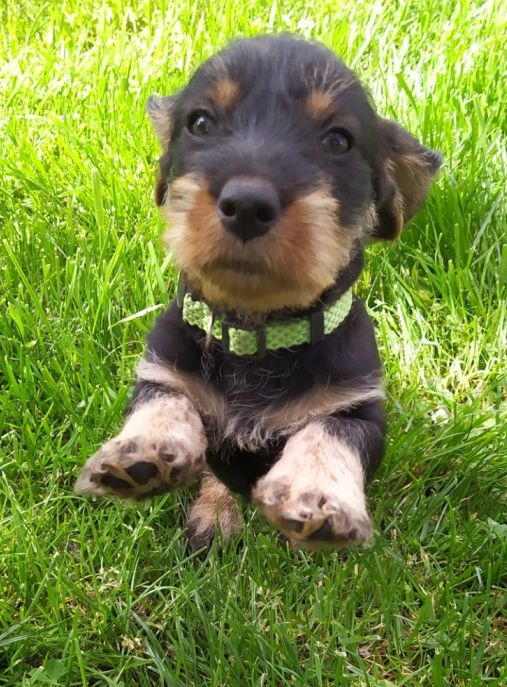Among the ancestors of the Dachshund Standard Wire-haired are the Bibarhund and the Dachsbracke, German hounds. Ancient excavations prove that they inhabited the globe several thousand years ago. The Wire-haired Dachshund is the result of a cross between a Smooth-haired Dachshund, Schnauzer, Dandie Dinmont Terrier and possibly a Scottish Terrier. The breed was established in the 19th century. With the advent of the wire-haired dachshund, the smooth-hair variety, which had so far been the favorite dog of the German emperors, decreased in popularity.
The Wire-haired Dachshund is best suited for hunting. This is possible thanks to a thick coat that protects the dog from the cold and sharp spines in dense brush. This dachshund is the most popular type of dachshund, which in its strong character expresses a large portion of terrier blood. The Wire-haired Dachshund is valued by hunters for its versatility and courage. It is taken for fox, badger and otter hunting.
- Life expectancy: 9 - 13 years
- Chest circumference over 35 cm
- Weight: up to 9 kg
Despite their great hunting passion, wire-haired dachshunds are very popular house dogs, pets for the whole family. The wire-haired variety is the most aggressive and daring of all Dachshunds, due to its relationship with terriers. These bright, devoted and cheerful dogs make wonderful companions. Vigilant and always ready to defend, the dachshund knows how to earn the respect of its surroundings. The Wire-haired Dachshund is very fond of children and other dogs. It is not very fond of cats, unless they are brought up together in their early youth.
Wire-haired dachshunds tend to be absorbing and therefore become possessive towards their owners. Other qualities that should be worked on during training are self-reliance, often perceived as disobedience, and independence that comes from the willingness to explore the environment. If you provide your dog with a variety of activities, it will be a calm and obedient family member. The wire-haired dachshund does not need long walks. Always keep it on a leash when hiking in the woods so that the smell of wild animals does not cause it to escape.
The Wire-haired Dachshund requires regular trimming, approximately once every 4 months. The hair on the top of the head should be cut short. If necessary, trim any excess hair between your dogs toe pads. The wire-haired dachshund's nails should be trimmed regularly, if the dog does not wear them off during walks.
The wire-haired dachshund can have the same colours as the smooth- and long-hair varieties.
One-color:
- red
- ore
- fawn without or with black hair
Two-color:
- black
- brown with rusty brown or yellow markings
- spotted
- brindle
Around the dog's muzzle, the hair forms a profuse mustache and bushy eyebrows above the eyes. The coat, except for the muzzle, eyebrows and ears, is rough with an undercoat. The hair adheres to the body. On the ears, the hair is shorter than on the rest of the body, almost smooth. The tail is evenly covered with tight-fitting hair.
The Wire-haired Dachshund is a strong and healthy breed. Do not allow your dog to jumps high and long because the spine, especially the discs, is not its strongest point. Dachshunds tend to build up tartar quickly so invest in teethers and get regular dental checkups.
Wire-haired dachshunds are greedy and can become obese if their diet is inadequate. They are also picky dogs, and they will not want to eat everything. Therefore, you must not allow them to be pampered. Unfortunately, the dachshund is gaining weight very quickly, its diet should be adapted to its activity, age and health condition. Dogs of this breed require an strict diet and a large portion of daily exercise. You can buy your dog a good dry food for medium or small breeds that are well balanced. Choose grain-free ones with a high content of fresh or dried meat.
A good solution is to use the Barf Diet for the Wire-haired Dachshund. It is based on raw meat, cartilage bones, raw giblets, fish, without the addition of rice, pasta or groats. Unprocessed meat is rich in minerals, vitamins and fatty acids. In meals that we will prepare ourselves, we should remember about additional supplementation. However, before we start giving various types of supplements, it is worth talking about them with a vet and doing basic blood tests.


















